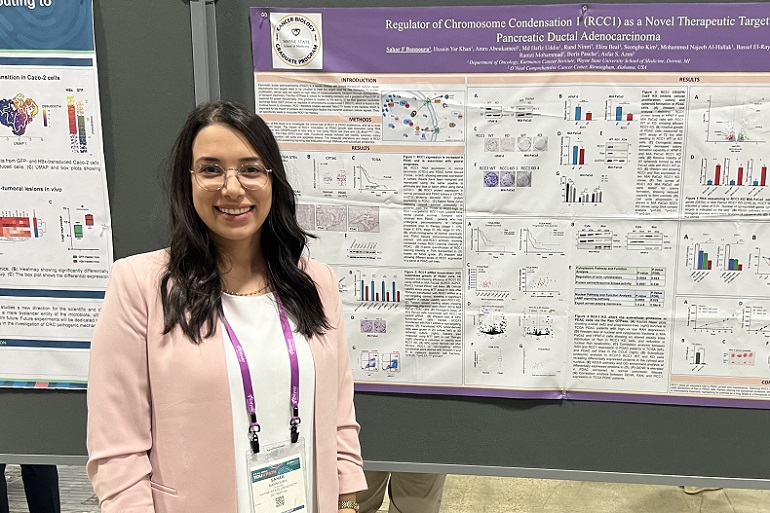
Sahar Bannoura, a doctoral candidate in her fifth year in the Cancer Biology Graduate Program at the Wayne State University School of Medicine and Barbara Ann Karmanos Cancer Institute, has been awarded a F99/K00 Predoctoral-to-Postdoctoral Fellow Transition Award from the National Cancer Institute of the National Institutes of Health. An international student from Bethlehem, Palestine, Bannoura is mentored by Professor of Oncology Asfar Azmi, Ph.D.
Only one application for the award is allowed to be submitted by each institution annually and this must be endorsed by its graduate school. Her project, “The role of guanine exchange factors in pancreatic ductal adenocarcinoma,” will focus on how a specific nuclear cytoplasmic trafficking process contributes to cancer development and progression. “By understanding this process better, we hope to discover new ways to treat cancer,” Bannoura said.
Pancreatic cancer is one of the deadliest cancers. By the time most patients are diagnosed, the disease is often in an advanced stage, making treatment difficult and ineffective. “It is important to study how pancreatic cancer develops and adapts in the body to find new treatments. The goal of doing research in pancreatic cancer is to ultimately improve the survival of patients with this diagnosis,” Bannoura said.
“I am very honored to receive this fellowship, and I am very excited to have this unique opportunity to further pursue my research interests at WSU, and as a postdoc in the future. I am very grateful for the support of my mentor, Dr. Asfar Azmi, and his guidance throughout my Ph.D. studies. I also want to thank the members of the research team in our lab. I am grateful for their support and collaboration, and I feel honored to be part of such a talented group. I am also grateful to the Cancer Biology Graduate program for its support and the unique opportunities it has provided me.”
The award supports outstanding doctoral candidates in completing their dissertation research training (F99 phase) and transition in a timely manner to mentored, cancer-focused postdoctoral career development research positions (K00 phase).
“I am absolutely thrilled and incredibly proud to see Sahar receive this prestigious award. This recognition not only honors Sahar’s exceptional achievements, but it also highlights her potential to make even greater contributions in the future. It has been a privilege to support and guide her during her Ph.D. I have no doubt this is just the beginning of many more accomplishments to come,” Dr. Azmi said.
Dr. Azmi also leads the Molecular Therapeutics Research Program and is director of Pancreas Cancer Research at the Barbara Ann Karmanos Cancer Institute. To his knowledge, the F99 is the first ever at WSU. He thanked Cancer Biology Graduate Program Director Larry Matherly, Ph.D., and Graduate School Dean Amanda Bryant-Friedrich, Ph.D., for supporting Bannoura’s application. “I would also like to thank her thesis committee members, Ramzi Mohammad, Ph.D., Izabela Podgorski, Ph.D., and Elisabeth Heath, M.D., for their guidance and support to Sahar that made this possible,” he said.
“Given its rarity, I feel incredibly honored and excited as a mentor to see one of my students receive this fellowship. It reflects her unique qualifications, exceptional research proposal and the outstanding potential she brings to the field of pancreatic cancer,” Dr. Azmi added. “This award not only underscores Sahar’s commitment to advancing scientific knowledge, it also elevates the entire research team’s profile. It’s a proud moment to witness Sahar’s hard work and talent being recognized in such a significant way, and I believe this will open new doors for her future endeavors and contribute greatly to our collective research goals.”
“The F99 award from the NIH helps to encourage outstanding graduate students who have great potential for independent research careers,” said Ezemenari M. Obasi, vice president for research and innovation at Wayne State University. “I look forward to seeing the important outcomes of Sahar’s important work that may one day guide clinicians to earlier detection and treatment of pancreatic cancer.”
The grant number for this NIH award is CA294132.